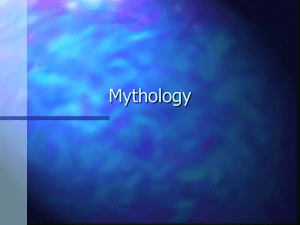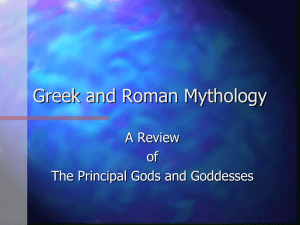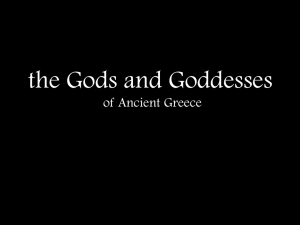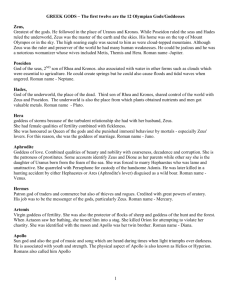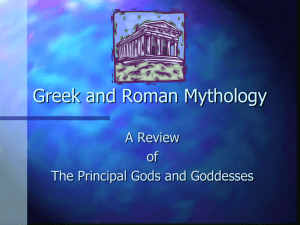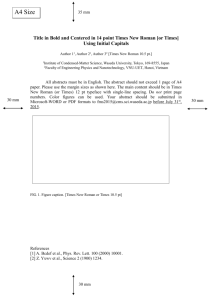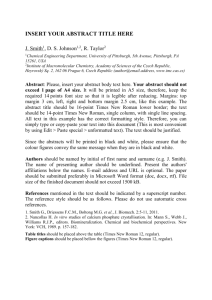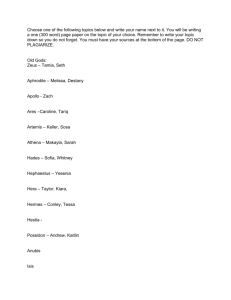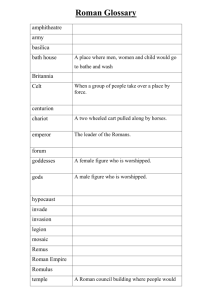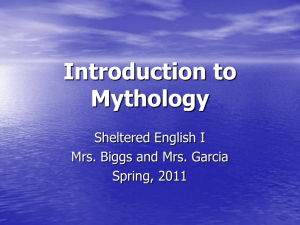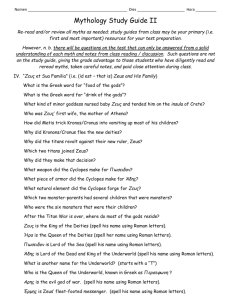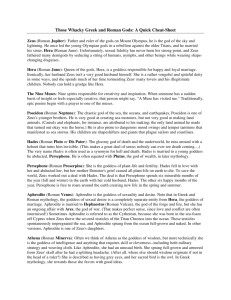Greek and Roman Mythology
advertisement
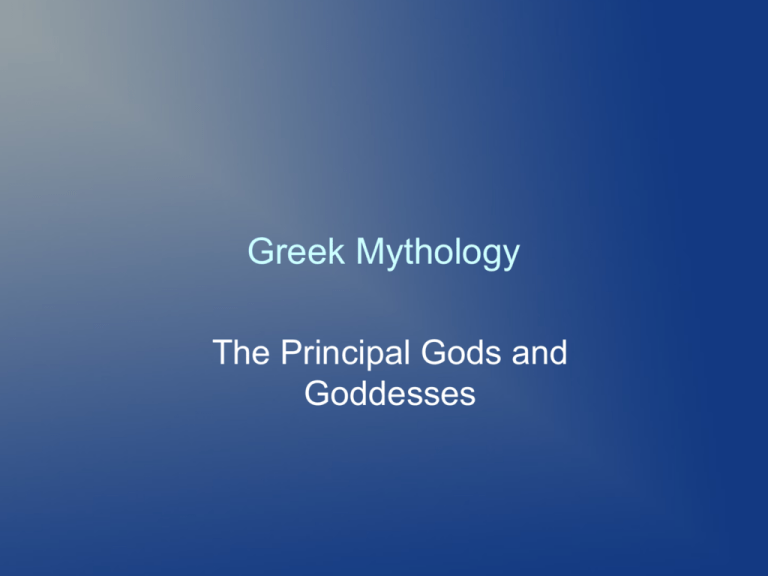
Greek Mythology The Principal Gods and Goddesses What is a myth? Often conflated with religion A traditional story rooted in folk beliefs of cultures Uses the supernatural to interpret natural events Explains the culture’s view of the universe and the nature of humanity Often illustrates transitions between cultures Often contradictory In the beginning... …was Chaos (shapeless nothingness) ● Chaos had two children: ● ● ● Night (darkness) Erebus (death) Love = darkness and death. ● Love lead to order and beauty ● And then... Order and Beauty lead to Light and Day. Earth (Gaea) was created. The Earth bore Heaven (Ouranos) to cover her and be a home for the gods. • Here's where weird logical contradictions creep in... The First Parents Mother Earth = Gaea (Gaia) Father Heaven = Ouranos (Uranus) They had three kinds of children: • Three monsters with 100 hands and 50 heads (Hekatonkheires) • Three cyclopes • The titans • Note... Man is not around yet The Titans (The Elder Gods) There were many of them − We only know about a few memorable ones Cronos (Time): Ruler of the titans (castrates Ouranos) Rhea (Fertility): Wife of Cronos Oceanus: River that encircled the world Iapetus: Father of Prometheus (Forethought), Epimetheus (Afterthought), and Atlas The Principal Gods Cronos and Rhea were parents of • • • • • • Zeus (kills Cronus) Poseidon Hades Hera Hestia Demeter Other Olympians include • • • • • • • • • • Athena Ares Hebe Hephaestus Apollo Artemis Hermes Aphrodite Dionysus Persephone Zeus Roman Name: Jupiter (also Jove) Sky god/Ruler of the Olympians. Fathered many characters in mythology Warred against most of the Titan Worried about a repeat he eats all his children Hera Roman Name: Juno Zeus’s sister and wife Jealous protector of marriage Punished the women Zeus fell in love with Poseidon Roman Name: Neptune God of the Seas and Waters “The Earthshaker” Hades Roman Name: Pluto God of the Underworld/ Dead Kidnapped Persephone Hestia Roman Name: Vesta Goddess of Home Powerful Protector The most worshipped of all the gods Demeter Roman Name: Ceres Goddess of the Harvest A Goddess of the Earth Athena Roman Name: Minerva Goddess of Wisdom and War Sprang fully grown from Zeus’s head Ares Roman Name: Mars God of War (really of battle rage) Son of Zeus and Hera Bloodthirsty and merciless Hephaestus Roman Name: Vulcan God of Fire/Forge Son of Zeus and Hera Crippled, Kindly, overly trusting and married to Aphrodite Apollo Roman Name: Apollo God of Light/Sun, Music and Healing Brother of Artemis Artemis Roman Name: Diana Goddess of the Moon/ Hunt Sister to Apollo Hermes Roman Name: Mercury Messenger of the Gods (to man), Patron of Thieves Appears in more myths than any other god Aphrodite Roman Name: Venus Goddess of Love and Beauty Sprang from the ocean foam Dionysus Roman Name: Bacchus God of Wine Patron god of Theatre and Actors Persephone Roman Name: Proserpina Goddess of the Underworld Daughter of Zeus and Demeter Abducted by Hades Hebe Roman Name: Juventas Goddess of Youth Cupbearer to the Gods Restored youth to the aged Eros Roman Name: Cupid Eternally Young God of Love/Lust (Sexual) Son of Aphrodite and Hephaestus Iris Goddess of the Rainbow Messenger for Zeus and Hera Daughter of the titan Thaumus and the nymph Electra The Muses Nine daughters of Zeus and Mnemosyne Goddesses who presided over the arts and sciences Clio (History), Urania (Astronomy), Thalia (Comedy), Melpomene (Tragedy), Erato (Love Poetry), Calliope (Epic Poetry), Euterpe (Song), Terpsichore (Dance), Polyhymnia (Hymns) The Graces Three Goddesses of Grace and Beauty Aglaia (Splendor) Euphrosyne (Mirth) Thalia (Good Cheer) The Erinnyes (The Furies) Roman Name: Furiae or Dirae (The Furies) Three Goddesses of Vengeance • • • Tisiphone Alecto Megaera They punish evildoers. The Fates Roman Name: Parcae, Moirae Three sisters • • • Clotho (“The Spinner”) Lachesis (“The disposer of lots”) Atropos (“The cutter”) They weave, measure, and cut the thread of life for humans. The Satyrs Gods of the woods and mountains “Shepherd gods” Goat men (like Pan) Companions of Dionysus They like to drink, dance, and chase nymphs. The Nymphs female nature deity associated with a particular location divine spirits who animate nature beautiful, young nubile maidens who love to dance and sing Sources Graphics in this presentation were taken from the following web sites: • • • • • • • \ http://www.bulfinch.org/fables/search.html http://www.pantheon.org/ http://www.messagenet.com/myths/ http://mythman.com/ http://web.uvic.ca/grs/bowman/myth/index.html http://www.paleothea.com/ http://www.entrenet.com/%7Egroedmed/greekm/myth.html
